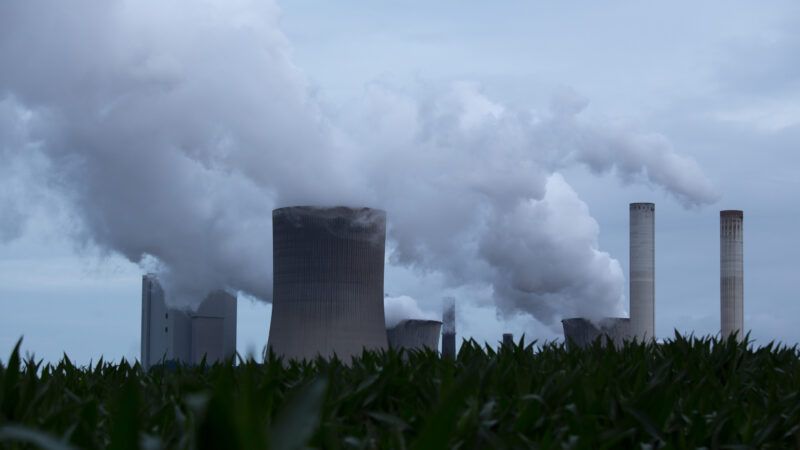The U.N. Tells the E.U. That Green Energy Goals Are Worth Freezing to Death Over
Europe is facing an energy crisis, but bureaucrats need to realize that long-term climate goals can be addressed without sacrificing the well-being of the population.

A United Nations (U.N.) commissioner said this week that the long-term climate crisis is more important than Europe's immediate energy needs.
As part of ongoing efforts to mitigate the effects of climate change, the European Union (E.U.) adopted plans intended to lower the continent's reliance on carbon-producing energy. "The fossil fuel economy has reached its limits," Ursula von der Leyen, the head of the E.U.'s executive body, declared last year.
Under its current framework, by the end of the decade, the E.U. seeks to cut greenhouse gas emissions by 55 percent from what they were in 1990. It further pledges to make the continent carbon neutral by 2050. To achieve these goals, the E.U. has mandated that countries make certain changes. In June, it passed a resolution that would ban all sales of cars with internal combustion engines by 2035. Many nations have also been phasing out coal-fired power plants that produce a disproportionate amount of global carbon emissions.
But Europe is currently in dire straits: Germany, its largest economy, traditionally derived more than a quarter of its electricity from natural gas, and more than half of its natural gas came from Russia through the Nord Stream pipeline. Russia provides about 40 percent of the entire continent's natural gas. Earlier this month, amid continued sanctions over its war against Ukraine, Russia announced that it had shut off the pipeline indefinitely. Germany had already begun to wean itself off of Russian fuel, but as of late June still relied on the Kremlin for about a quarter of its natural gas, specifically the portion used to heat more than a third of German homes.
Now, in the face of potential energy rationing, the E.U. and European governments are spending at least 50 billion euros ($50 billion) on imports of coal and natural gas, and reactivating shuttered coal plants. Virginijus Sinkevičius, an E.U. environmental commissioner, said the organization is still committed to overall carbon neutrality by 2050, and the brief return to carbon-emitting power options is merely temporary: "It is important to combine use of coal as a last possible alternative with a speeding up of energy efficiency projects and development of renewables."
Not everybody agrees: In a statement to the U.N.'s Human Rights Council, Nada Al-Nashif, the Acting High Commissioner for Human Rights, gave an update on human rights concerns around the world. She mentioned ongoing hostilities in countries like Libya and Ethiopia, as well as potentially positive developments in certain other nations.
While it would be unfair to criticize Al-Nashif for leaving out any particular global crisis on a planet of nearly 7 billion—for example, only briefly mentioning China's ongoing subjugation of Uyghur Muslims—she did dedicate several sentences to European energy policy.
"In the face of soaring energy prices which threaten to impact the most vulnerable as winter approaches, some EU member States are turning to investments in fossil fuels infrastructure and supplies. While that impulse is understandable, I urge the EU and its member States to consider the long-term consequences of locking in more fossil fuel infrastructure. It is essential to accelerate the development of energy efficiency projects and renewables. There is no room for backtracking in the face of the ongoing climate crisis."
Lowering carbon emissions is a noble and necessary goal, but Al-Nashif's message rings paternalistic. While agreeing that a choice between sky-high energy prices and potentially freezing to death in your home would "threaten to impact the most vulnerable," she nonetheless cautions against any solution that may involve coal or gas.
The inconvenient truth is that Europe doesn't have better options. Last month, Germany announced that it would keep its last three nuclear power plants open instead of shuttering them as planned. This would achieve both goals, by preserving a carbon-free energy source, but those three plants alone only account for about 5 percent of Germany's total energy usage, not nearly enough to replace the amount lost from Russia. Notably, Germany closed 14 other nuclear plants in the years since the 2011 Fukushima meltdowns.
Now, as European nations face an energy crisis, bureaucrats in Brussels are encouraging moderation in their response. Really, they should be throwing the kitchen sink at the problem. Long-term climate goals can be addressed without sacrificing the immediate well-being of the European population.


Show Comments (93)